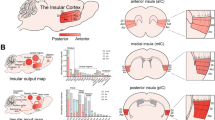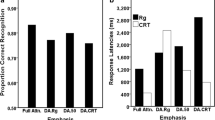Abstract
The Affective Embodiment Account posits that sensorimotor interactions play an important role in learning and processing concrete words whereas experiences from emotional states play an important role in learning and processing abstract words. Because of this, there should be greater enhancement of valence for abstract than for concrete words and therefore there should be an interaction between valence and concreteness. Although this prediction has been observed in a number of tasks, very few studies have looked specifically at memory. Three experiments are reported that assess whether valence interacts with concreteness in recognition. In Experiment 1, recognition of concrete words was better than abstract, but there was no difference as a function of whether the words were positive or negative and there was no interaction. Experiment 2 compared positive and neutral words and Experiment 3 compared negative and neutral words; in both, there was a concreteness effect but no effect of valence and no interaction. These results replicate previous findings that when positive and negative words are equated more fully, valence has no effect on recognition, and also suggest a limit on the scope of the Affective Embodiment Account.

Similar content being viewed by others
Data availability
Data and stimuli are available via the Open Science Framework at: https://doi.org/10.17605/OSF.IO/F6TPN
Notes
Kim et al. (2020) made their data available, which enabled a re-analysis using Bayesian analysis of variance. The description in this paragraph is based on our Bayesian re-analysis.
Full details, including R code, are available via the Open Science Framework at https://doi.org/10.17605/OSF.IO/F6TPN
The stimuli for all experiments, as well as analyses showing there were no significant differences on these dimensions, are available via the Open Science Framework at https://doi.org/10.17605/OSF.IO/F6TPN.
We thank an anonymous reviewer for raising this possibility.
References
Adelman, J. S., & Estes, Z. (2013). Emotion and memory: A recognition advantage for positive and negative words independent of arousal. Cognition, 129(3), 530–535. https://doi.org/10.1016/j.cognition.2013.08.014
Balota, D. A., Yap, M. J., Cortese, M. J., Hutchison, K. A., Kessler, B., Loftis, B., Neely, J. H., Nelson, D. L., Simpson, G. B., & Treiman, R. (2007). The English lexicon project. Behavior Research Methods, 39(3), 445–459. https://doi.org/10.3758/BF03193014
Barsalou, L. W. (2008). Grounded cognition. Annual review of psychology, 59, 617-645. https://doi.org/10.1146/annurev.psych.59.103006.093639.
Bireta, T. J., Guitard, D., Neath, I., & Surprenant, A. M. (2021). Valence does not affect serial recall. Canadian Journal of Experimental Psychology, 75(1), 35–47. https://doi.org/10.1037/cep0000239
Bowen, H. J., Kark, S. M., & Kensinger, E. A. (2018). NEVER forget: Negative emotional valence enhances recapitulation. Psychonomic Bulletin & Review, 25(3), 870–891. https://doi.org/10.3758/s13423-017-1313-9
Bowen, H. J., Spaniol, J., Patel, R., & Voss, A. (2016). A diffusion model analysis of decision biases affecting delayed recognition of emotional stimuli. PLoS One, 11(1). https://doi.org/10.1371/journal.pone.0146769
Bradley, M. M., & Lang, P. J. (1999). Affective norms for English words (ANEW): Instruction manual and affective ratingsTechnical Report C-1,. The Center for Research in Psychophysiology, University of Florida.
Brysbaert, M., & New, B. (2009). Moving beyond Kuçera and Francis: A critical evaluation of current word frequency norms and the introduction of a new and improved word frequency measure for American English. Behavior Research Methods, 41(4), 977–990. https://doi.org/10.3758/BRM.41.4.977
Brysbaert, M., Mandera, P., McCormick, S. F., & Keuleers, E. (2019). Word prevalence norms for 62,000 English lemmas. Behavior Research Methods, 51(2), 467–479. https://doi.org/10.3758/s13428-018-1077-9
Brysbaert, M., Warriner, A. B., & Kuperman, V. (2014). Concreteness ratings for 40 thousand generally known English word lemmas. Behavior Research Methods, 46(3), 904–911. https://doi.org/10.3758/s13428-013-0403-5
Grider, R. C., & Malmberg, K. J. (2008). Discriminating between changes in bias and changes in accuracy for recognition memory of emotional stimuli. Memory & Cognition, 36(5), 933–946. https://doi.org/10.3758/MC.36.5.933
Guitard, D., Miller, L. M., Neath, I., & Roodenrys, S. (2019). Does contextual diversity affect serial recall? Journal of Cognitive Psychology, 31(4), 379–396. https://doi.org/10.1080/20445911.2019.1626401
Guitard, I., Neath, I., & Saint-Aubin, J. (in press). Additional evidence that valence does not affect serial recall. Quarterly Journal of Experimental Psychology. https://doi.org/10.1177/17470218221126635
Hamilton, L. J., & Allard, E. S. (2020). Words matter: Age-related positivity in episodic memory for abstract but not concrete words. Aging, Neuropsychology, and Cognition, 27(4), 595–616. https://doi.org/10.1080/13825585.2019.1657556
JASP Team (2023). JASP (Version 0.17.2) [Computer software] https://jasp-stats.org/
Kim, J. M., Sidhu, D. M., & Pexman, P. M. (2020). Effects of emotional valence and concreteness on children’s recognition memory. Frontiers in Psychology, 11:615041. https://doi.org/10.3389/fpsyg.2020.615041
Kousta, S.-T., Vigliocco, G., Vinson, D. P., Andrews, M., & Del Campo, E. (2011). The representation of abstract words: Why emotion matters. Journal of Experimental Psychology: General, 140(1), 14–34. https://doi.org/10.1037/a0021446
Künecke, J., Sommer, W., Schacht, A., & Palazova, M. (2015). Embodied simulation of emotional valence: Facial muscle responses to abstract and concrete words. Psychophysiology, 52(12), 1590–1598. https://doi.org/10.1111/psyp.12555
Kuperman, V., Stadthagen-Gonzalez, H., & Brysbaert, M. (2012). Age-of-acquisition ratings for 30,000 English words. Behavior Research Methods, 44(4), 978–990. https://doi.org/10.3758/s13428-012-0210-4
MacMillan, M. B., Field, H. R., Neath, I., & Surprenant, A. M. (2022). Valence does not affect recognition. Canadian Journal of Experimental Psychology, 76(2), 111–121. https://doi.org/10.1037/cep0000275
MacMillan, M. B., Neath, I., & Surprenant, A. M. (2021). Re-assessing age of acquisition effects in recognition, free recall, and serial recall. Memory & Cognition, 49(5), 939–954. https://doi.org/10.3758/s13421-021-01137-6
Macmillan, N. A., & Creelman, C. D. (2005). Detection theory: A user's guide (2nd ed.). Erlbaum.
Madan, C. R. (2021). Exploring word memorability: How well do different word properties explain item free-recall probability? Psychonomic Bulletin & Review, 28(2), 583–595. https://doi.org/10.3758/s13423-020-01820-w
Neath, I., & Quinlan, P. T. (2021). The item/order account of word frequency effects: Evidence from serial order tests. Memory & Cognition, 49(6), 1188–1203. https://doi.org/10.3758/s13421-021-01144-7
Neath, I., & Surprenant, A. M. (2020). Concreteness and disagreement: Comment on Pollock (2018). Memory & Cognition, 48(4), 683–690. https://doi.org/10.3758/s13421-019-00992-8
Neath, I., Hockley, W. E., & Ensor, T. M. (2022). Stimulus-based mirror effects revisited. Journal of Experimental Psychology: Learning, Memory, and Cognition, 48(12), 1833–1849. https://doi.org/10.1037/xlm0000901
Osgood, C. E., Suci, G. J., & Tannenbaum, P. H. (1957). The measurement of meaning. University of Illinois Press.
Paivio, A. (1968). A factor-analytic study of word attributes and verbal learning. Journal of Verbal Learning & Verbal Behavior, 7(1), 41–49. https://doi.org/10.1016/S0022-5371(68)80161-6
Palazova, M., Sommer, W., & Schacht, A. (2013). Interplay of emotional valence and concreteness in word processing: An event-related potential study with verbs. Brain and Language, 125(3), 264–271. https://doi.org/10.1016/j.bandl.2013.02.008
Ponari, M., Norbury, C. F., & Vigliocco, G. (2018). Acquisition of abstract concepts is influenced by emotional valence. Developmental Science, 21(2), 1–12. https://doi.org/10.1037/t15170-000
Schönbrodt, F. D., & Wagenmakers, E.-J. (2018). Bayes factor design analysis: Planning for compelling evidence. Psychonomic Bulletin & Review, 25(1), 128–142. https://doi.org/10.3758/s13423-017-1230-y
Sheikh, N. A., & Titone, D. A. (2013). Sensorimotor and linguistic information attenuate emotional word processing benefits: An eye-movement study. Emotion, 13(6), 1107–1121. https://doi.org/10.1037/a0032417
Spaniol, J., Voss, A., & Grady, C. L. (2008). Aging and emotional memory: Cognitive mechanisms underlying the positivity effect. Psychology and Aging, 23(4), 859–872. https://doi.org/10.1037/a0014218
Vigliocco, G., Meteyard, L., Andrews, M., & Kousta, S. (2009). Toward a theory of semantic representation. Language and Cognition, 1(2), 219–247. https://doi.org/10.1515/LANGCOG.2009.011
Warriner, A. B., Kuperman, V., & Brysbaert, M. (2013). Norms of valence, arousal, and dominance for 13,915 English lemmas. Behavior Research Methods, 45(4), 1191–1207. https://doi.org/10.3758/s13428-012-0314-x
Wetzels, R., Matzke, D., Lee, M. D., Rouder, J. N., Iverson, G. J., & Wagenmakers, E.-J. (2011). Statistical evidence in experimental psychology: An empirical comparison using 855 t tests. Perspectives on Psychological Science, 6(3), 291–298. https://doi.org/10.1177/1745691611406923
Winter, B. (2023). Abstract concepts and emotion: Cross-linguistic evidence and arguments against affective embodiment. Philosophical Transactions of the Royal Society of London. Series B, Biological Sciences, 378(1870), 20210368. https://doi.org/10.1098/rstb.2021.0368
Yao, B., Keitel, A., Bruce, G., Scott, G. G., O'Donnell, P. J., & Sereno, S. C. (2018). Differential emotional processing in concrete and abstract words. Journal of Experimental Psychology: Learning, Memory, and Cognition, 44(7), 1064–1074. https://doi.org/10.1037/xlm0000464
Code availability
Custom code is available via the Open Science Framework at: https://doi.org/10.17605/OSF.IO/F6TPN
Author Notes
This work was supported, in part, by a grant from the Natural Sciences and Engineering Research Council to DG. Order of authorship is alphabetical.
Open practices statement
The stimuli, simulation code, raw data, and supplementary analyses are available via the Open Science Framework at: https://doi.org/10.17605/OSF.IO/F6TPN.
Funding
Portions of the research were supported by a grant from the Natural Sciences and Engineering Research Council of Canada to DG.
Author information
Authors and Affiliations
Corresponding author
Ethics declarations
Conflicts of interest/Competing interests
Not applicable.
Ethics approval
The research was approved by the IRB of the College of New Jersey and by School of Psychology Ethics Committee of Cardiff University.
Consent to participate
Informed consent was obtained from all individual subjects included in the study.
Consent to publish
Informed consent to publish was obtained from all individual subjects included in the study.
Additional information
Publisher’s note
Springer Nature remains neutral with regard to jurisdictional claims in published maps and institutional affiliations.
Rights and permissions
Springer Nature or its licensor (e.g. a society or other partner) holds exclusive rights to this article under a publishing agreement with the author(s) or other rightsholder(s); author self-archiving of the accepted manuscript version of this article is solely governed by the terms of such publishing agreement and applicable law.
About this article
Cite this article
Bireta, T.J., Guitard, D., Neath, I. et al. Valence and concreteness in item recognition: Evidence against the affective embodiment account. Psychon Bull Rev (2023). https://doi.org/10.3758/s13423-023-02442-8
Accepted:
Published:
DOI: https://doi.org/10.3758/s13423-023-02442-8




